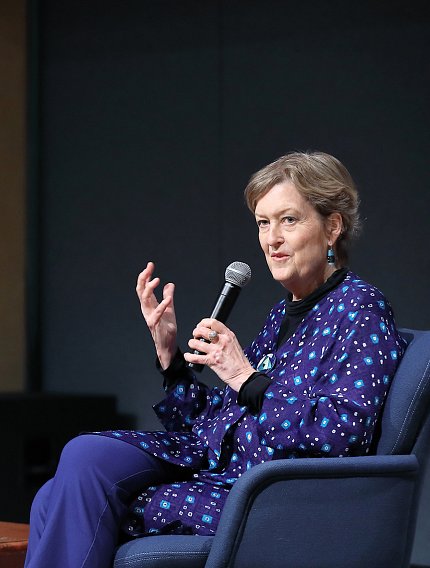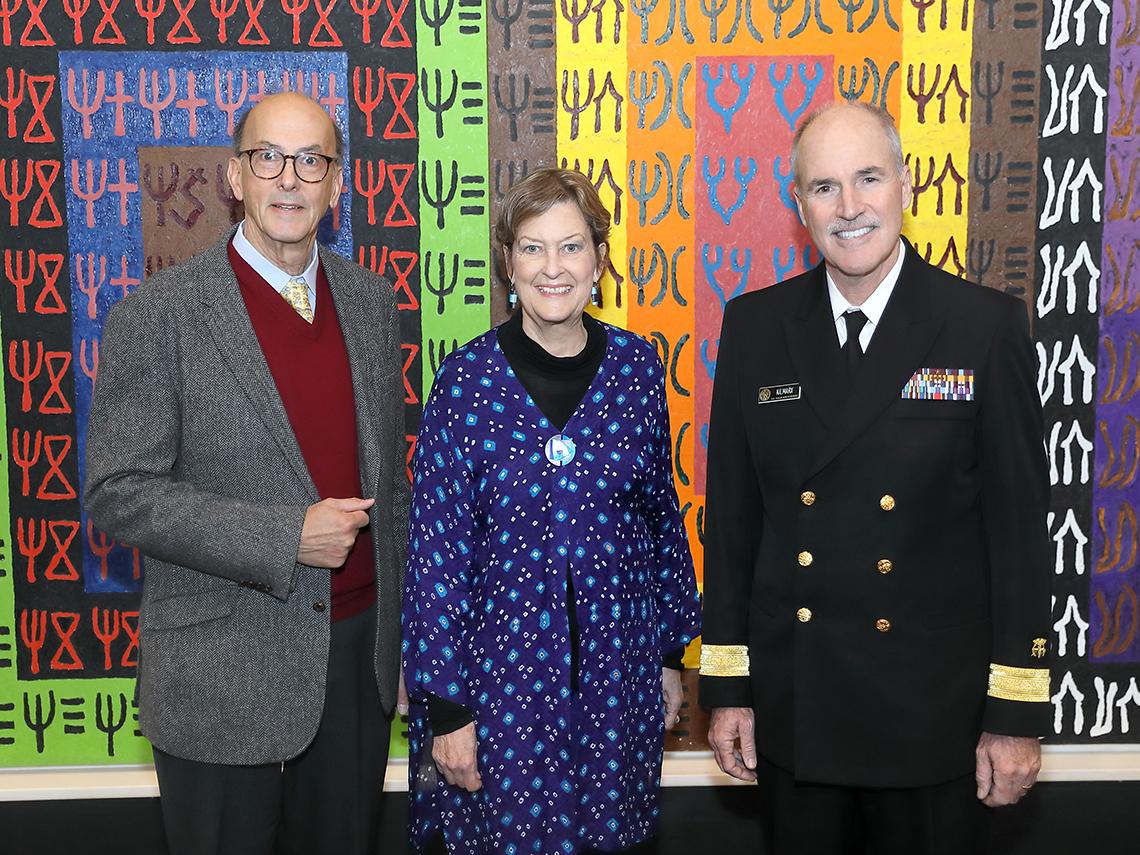Peace Corps Director Urges CFC Donations, Volunteers

Photo: Chia-Chi Charlie Chang
A passion for service unites NIH staff and Peace Corps volunteers, observed Dr. Jody Olsen, Peace Corps director and this year’s honorary chair of the Combined Federal Campaign. During a recent visit to NIH for a fireside chat with Fogarty International Center director Dr. Roger Glass, she reflected on the shared history of the CFC and the Peace Corps, which were both established by President John F. Kennedy in 1961. The Peace Corps motto—Work for the World—extends to its support for the CFC, to provide critical assistance in local communities, across the nation and around the world, Olsen said.
The needs are great, both at home and overseas, she acknowledged. “What we do personally and professionally interacts with the work of CFC charities every day. And our choosing to make a contribution and/or volunteer with one of the charities to me is a natural extension of who we are as employees and as employees giving service.”
She applauded the NIH community for its continuing generosity to the CFC and for the agency’s commitment to improving the world’s health.
“For federal government employees, it’s about service—we do research, we do training, we manage, we give grants, we cheer on academics, but we’re serving,” she said. “As employees, we serve. And at Peace Corps, another federal agency, as volunteers, we serve and I think that’s a really common driver.”
A number of Peace Corps alumni are NIH employees and have formed a local chapter of Returned Peace Corps Volunteers (RPCV), where members continue their tradition of service, working with the Children’s Inn at NIH and other causes.
Everyone should consider volunteering in some capacity, according to the National Commission on Military, National and Public Service. “Largely it’s about being asked and being shown how easy it is to serve,” Olsen noted.
She encouraged NIH employees to consider taking time off to volunteer through the Peace Corps Response program, designed for experienced, mid-career professionals to undertake short-term, high-impact service assignments in the country of their choice. A background in health research is especially useful. For example, one volunteer helped an HIV facility in South Africa dramatically reduce the time it took to locate patient files for clinic visits. It’s a mutually beneficial experience, Olsen said. “What you would bring back is phenomenal.”
For the first year after returning to the U.S., RPCVs receive special hiring preference to help them enter the federal workforce, Olsen said. Hiring managers tell her they prefer returned volunteers because of their adaptability and unique perspective. In addition, 120 graduate schools award $11 million each year through a fellowship program for RPCVs, with an emphasis on those working in health fields.

Photo: Chia-Chi Charlie Chang
Since its inception, more than 235,000 Americans have joined the Peace Corps and served in 141 countries. Olsen—who grew up in Utah—enrolled after she graduated from college in 1966. She said she’d always wanted to get on a plane and was intrigued by the idea of living in a strange place.
She soon found herself standing in front of a class of Tunisian boys, tasked with teaching them English, she said. “That moment, as we all know very well, that you step forward and say this is the beginning of something…you embark on an adventure that forever changes your life and that’s what it did for me.”
Becoming immersed in a culture that was so different from her own was transformative, she recalled. “We bring with us to an experience a structure, a language, and those that are very close to us, and we have a behavior pattern. And now we give up that entire pattern, we give up all those that are close to us, we give up that language that we dream in, we give up at least on the surface a sense of values that we thought we had, and so we strip ourselves away, and why the experience is so profound is because we find a new survival.” She began to develop close relationships with people who were totally different from her and they soon became her family, and she theirs.
She said this immersion forced her to learn to listen and observe more intently, to learn to live and breathe the experience in order to comprehend it. “And it’s that ability to understand that I think carries us forward for the rest of our lives because that’s what helps push us outward to try new things, and to be more accepting of diversity, more accepting of differences, whatever range of differences they are.”
In closing, Glass echoed Olsen’s support for the CFC and reflected on his own early-career experiences trying to save children with diarrheal diseases in Bangladesh. “Giving back is part of what makes us human and demonstrates our caring for others, whether it’s at home or abroad,” he said.
Returned Peace Corps volunteers at NIH are encouraged to join the NIH RPCV group listserv at https://go.usa.gov/xperh.
